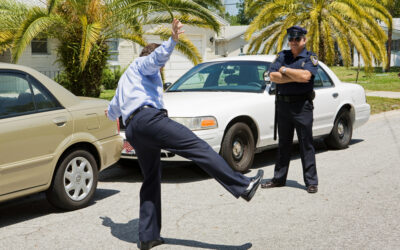Driving under the influence (DUI) of alcohol is a severe offense in California. CA Vehicle Code § 23152 (a) describes when a person can be charged with a DUI under California law. The penalties could be tough if you have been arrested and face DUI charges.
You must take steps to retain a powerful legal defender who can help you clear the charges against you. Our Los Angeles DUI lawyer can help you protect your future and return to your life.
CA Vehicle Code § 23152 (a) ‘Driving Under the Influence of Alcohol’
California Vehicle Code § 23152 (a) prohibits individuals from driving under the influence of alcohol. However, it is essential to note that displaying signs of intoxication could result in a DUI charge even if your blood alcohol content (BAC) levels fall below the legal limit of .08%.
If you are a non-commercial adult driver, and your measurable blood alcohol content level registers at .08% or higher, not only will you be charged with driving under the influence under CA Vehicle Code § 23152 (a), but you can also face driving with excessive BAC charges under California Vehicle Code § 23152(b).
For the prosecuting attorney to prove guilt beyond a reasonable doubt, they must show you were responsible for driving the motor vehicle in question and that you were under the influence of alcohol and showing symptoms of intoxication at the time you were driving.
What ‘Under the Influence’ Means in California’s Drunk Driving Law?
A BAC in a DUI case is not the only definition of impairment under CA Vehicle Code § 23152 (a). When looking at the law, “under the influence” should be taken literally. It means a person’s mental and/or physical abilities are impaired to the extent that they cannot operate a motor vehicle safely or with the same ability as a sober driver.
- Physical impairment can include poor motor coordination or control, an inability to perform normal driving maneuvers, and slow reflexes that would make reacting to environmental changes difficult. If the driver is not in control of their actions, a police officer can conclude they are impaired.
- Mental impairment can include lower attention span when driving, poor memory, and an inability to make sound decisions quickly.
Law enforcement officers in Southern California use various tools to measure one’s BAC levels before they seek drunk driving charges. They can test a breath sample using a breathalyzer or another device. They can also use a DUI blood test that measures how much ethyl alcohol is in the bloodstream.
A person’s blood alcohol concentration can support reasonable suspicion of alcohol use, but that’s not always the whole story when examining someone’s blood sample.
How Circumstantial Evidence Can Be Used in VC § 23152 (a) Cases
Law enforcement officers can use circumstantial evidence to show you were under the influence of alcohol at the time of your stop. Examples of such evidence could include police officer testimony that they observed the following symptoms of intoxication before or during your traffic stop:
- Slurred speech
- Erratic driving patterns
- Bloodshot or watery eyes
They can also report other signs of DUI they noted during the traffic stop, such as:
- The smell of alcohol coming from your motor vehicle
- An uneven gait when asked to walk during a field sobriety test
- Failed your preliminary alcohol screening (PAS) test or field sobriety test
- Your admission that you were drinking and driving under the influence
Can Circumstantial Evidence Prove Evidence of Impairment Exists?
Not always. You can dispute the circumstantial evidence used to establish drunk driving charges. Such evidence often relies on another person’s subjective view or interpretation of what they see and experience.
For example, if a law enforcement officer believes your speech was slurred or you were driving erratically due to using alcohol or other substances (i.e., drugged driving), you could explain you were on prescription medication at the time or feeling tired, sick, or nervous when the police pulled you over.
The reliability and accuracy of circumstantial evidence can be challenged, as they do not always mean someone has engaged in impaired driving. You can tell your story to our criminal defense attorney, who has extensive experience with California DUI cases. We can explain how you can counter this evidence and tell you if the prosecution has insufficient evidence.
Can You Challenge VC §23152 (a) Criminal Charges?
If you have been charged with drunk driving under CA Vehicle Code §23152 (a), you may be able to use several defenses to the charges. First, you may want to consider working with the state’s prosecuting attorney to obtain a plea agreement or enter a pretrial diversion program.
The state may be willing to reduce or dismiss the charges against you once you complete the terms of a DUI plea bargain or pretrial diversion program. However, if your attorney thinks it is in your best interests to present an effective defense strategy, multiple approaches could apply to your case. Common defenses include:
- The field sobriety test was inaccurate.
- You were not intoxicated at the time of the traffic stop.
- There were no signs of alcohol impairment during the stop.
- A medical condition caused you to drive erratically or have BAC levels above the legal limit of .08%.
A defense attorney can review your case for evidence that the police officers failed in their duties by:
- Committing misconduct
- Lacking probable cause to suspect DUI
- Stopping you improperly
- Failing to follow proper procedures and protocols
- Failing to administer chemical blood alcohol tests accurately
- Violating your constitutional rights, such as failing to read your Miranda rights
After closely analyzing the evidence in your case, your criminal record, aggravating and mitigating factors, and the penalties you face, our attorney will explain how to best approach your defense for a misdemeanor offense or a felony offense.
What Are the Penalties of a DUI Conviction Under CA VC § 23152(a)?
If you are convicted of driving under the influence of alcohol under CA Vehicle Code § 23152 (a), the consequences can negatively affect your life. Even as a first-time offender, you could be looking at the following penalties. Defendants facing these drunk driving charges face the following:
- Up to six months of jail time
- A maximum of five years of summary probation
- Up to 90 hours of DUI school (a mandatory alcohol education program)
- Attendance at a Victim Impact Panel
- Up to $1,000 in fines
- A mandatory minimum six-month driver’s license suspension
- Installation of an ignition interlock device (IID)
Sentencing Enhancements for Repeat DUI Offenses
Repeat offenders will see harsher penalties for multiple DUIs. The time you spend in jail, on probation, and attending DUI school will increase with the number of DUI convictions you have. The size of the fines you must pay will also increase.
For example, if this is your third DUI, you could expect to have your license suspended for up to three years, spend a minimum of one year in county jail, and have an IID installed for up to two years.
You could also expect stricter penalties if aggravating factors are present. For example, if you were found to have BAC levels of .15% or higher or if you violated California Vehicle Code § 23582 by speeding, you could expect more jail or prison time, higher fines, and more severe consequences in general.
How Can a DUI Conviction for Impaired Driving Affect Your Life?
The criminal consequences of a DUI conviction can severely affect your life right now. But it can also affect your future in ways you may not realize. Common collateral consequences you could be facing include:
- Citizenship and immigration troubles
- Being passed over for job opportunities and career advancement
- Been disqualified from Federal student aid eligibility
- Being denied housing
- Suspension or revocation of your professional licenses
- Difficulty maintaining relationships with family and friends
- A destroyed professional reputation
- Visitation and child custody issues
Pretrial Diversion Programs Could Be a Better Option
Instead of preparing to take your case to trial, our Los Angeles DUI lawyer might recommend that you work with the district attorney to get you into a pretrial diversion program. This is often an attractive option for people who have never had a DUI charge. However, you may only be eligible as a first-time offender if no one was injured.
You must meet specific criteria if you want to join a pretrial diversion program. If you fail to meet the program’s terms, you can expect the prosecutor to move forward with the drunk driving charges against you. Requirements you may need to follow include:
- Attending group therapy (e.g., Alcoholics Anonymous or another 12-step program)
- Attending mental health counseling
- Completing DUI school
- Completing community service hours
- Completing a drug or alcohol rehab program
- Paying restitution to victims
- Covering court costs
- Undergoing random drug or alcohol testing
- Obtaining gainful employment
- Completing a MADD VIP program
- Completing a HAM program
If you are interested in finding out whether you could get your DUI charges reduced to a lesser offense, such as a wet reckless charge, be sure to discuss this option with our criminal defense lawyer. We can explain if a wet reckless charge is better than a DUI for your situation.
Can a Conviction Under VC § 23152 (a) Be Expunged?
Once you have completed the terms of your DUI sentencing, you may be eligible for expungement of your conviction. However, you must meet particular requirements. You can review your eligibility status and criteria when discussing your conviction with our team.
Get Help for a Driving Under the Influence of Alcohol Charge
If you have been charged with drunk driving under CA Vehicle Code 23152 (a) – Driving Under the Influence of Alcohol, take steps now to protect your future. Prosecutors are reviewing your case to determine how to make you pay for a DUI.
You can hire a Los Angeles DUI lawyer who will work for a positive outcome. You can get a confidential consultation today to learn more about how to avoid the consequences of a DUI conviction. Call or contact us online for legal representation today.







